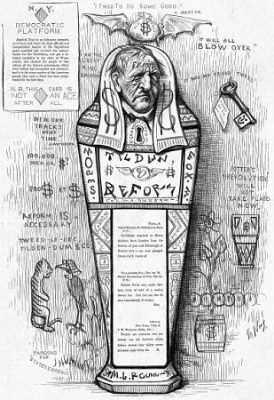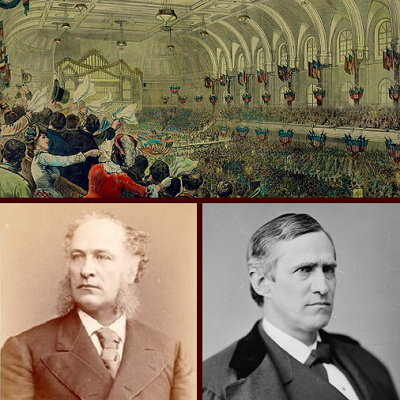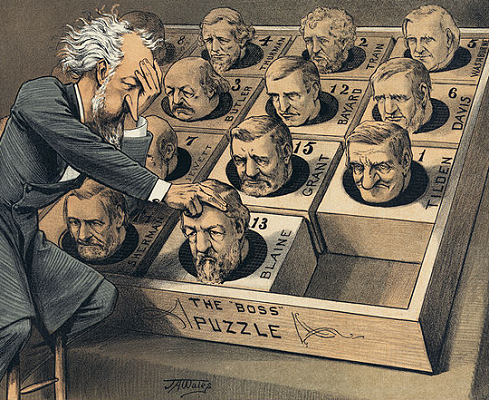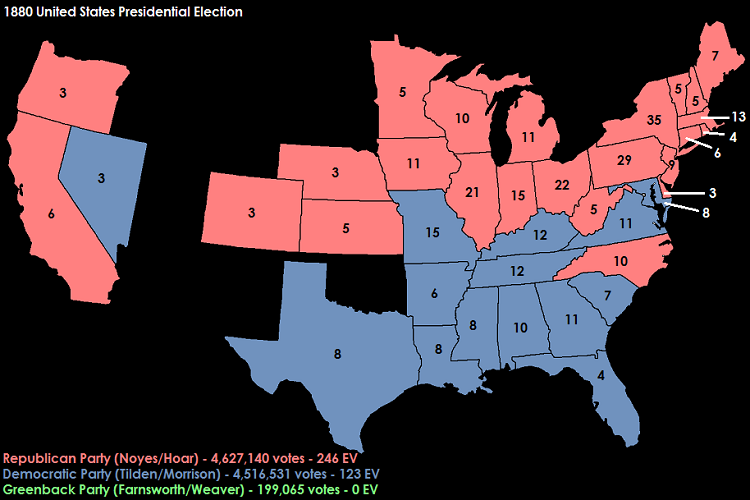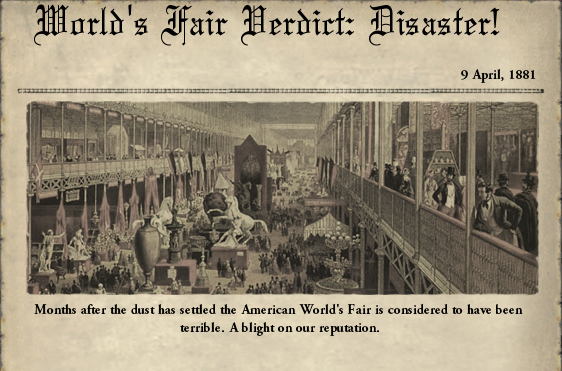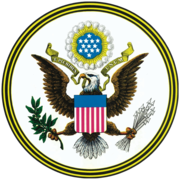
XV: New Course
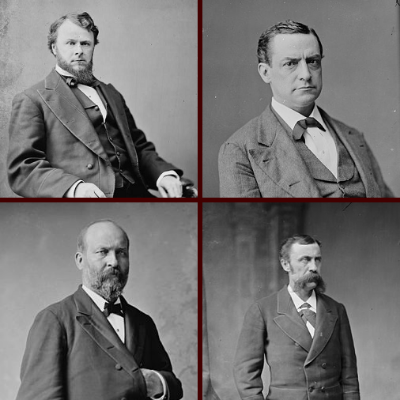
Clockwise from Top Left:
Nathaniel Farnsworth, Samuel J. Randall, Joseph Blackburn, James Garfield
The 1878 mid-term elections proved a mixed blessing for the Democrats. The legislatures of the increasingly ‘solid’ South ejected the last of their Republican Senators, bringing both parties equal in the upper chamber [1]. With Vice-President Hendricks’ deciding vote this gave the Democrats technical control for the first time in a generation. In the House of Representatives the party’s majority was slashed from 38 to 7. A lack of confidence in Tilden’s Administration combined with continued distrust towards the Republicans proved a boon for the Greenback Party who tripled their gains from 1876. These inroads combined with the success of prohibition in Kansas and the perceived lack of direction in both main parties was hailed as the arrival of the mythical third party in American politics. Nathaniel Farnsworth, Greenback congressman and de facto party leader thanks to an ailing Peter Cooper, had dominated newspaper coverage of the election, his fiery rhetoric uniting Western farmers and disenchanted Eastern radicals. Democrats and Republicans alike assessed this new threat. Reading the results of the election Tilden was less interested in the drama of the Greenback insurgency than the composition of the Congressional Democratic Party.
The lion’s share of Democratic losses in the House had come in Northern districts while there had actually been several gains in the South, all by young populists driven more by economics than race. Nonetheless it was a blow to the President’s Bourbon faction, the consequences of which quickly emerged. Samuel J. Randall, the sitting Speaker of the House and a prominent Tilden ally was up for re-election. Well respected for his incorruptibility and overseeing a Democratic majority, the vote was expected to be a simple formality. It came as a surprise then when Joseph Blackburn of Arkansas, elder statesman of the populist wing, put himself forward for his party’s nomination. Randall was personally unpopular with Southern Democrats due to what was seen as his slavish support for Tilden during the Amendment dispute and his hard money position at a time when debt-ridden cotton farmers were increasingly advocating an inflationary ‘free silver’ policy [2]. Such views were not universal amongst southern congressmen but the deciding faction, the formerly Rejecter conservatives, conceded to a favourite son candidate over Randall who lost with 69 votes to 86. Blackburn promptly won the all-House vote in March against his Republican opponent James Garfield, a man he had faced in battle fifteen years prior.
Though Randall graciously accepted his ousting it further undermined Tilden’s authority in the eyes of the nation. Amongst the President’s backers in East Coast financial circles the ‘Dixie coup’ was cause for concern. News of the result triggered a flutter on the still-delicate New York Stock Exchange. The joke quickly spread that Tilden had pulled off the impressive feat of being the first lame duck president to control both Houses of Congress. That the new Speaker was a Confederate veteran also raised a few eyebrows. Some cheered the appointment as a sign of national reconciliation while others mourned it as the end of the post-war dream envisioned by President Lincoln, who had died just several weeks earlier [3]. As Tilden rode out the storm from Blackburn's victory, the two years-long Gaston Committee presented its findings in April 1879. Established under Secretary of War William Gaston in the days immediately following the President’s inauguration, the committee had been charged with investigating the Army’s middling performance in the Mexican War. A shortage of experienced junior officers, poor use of artillery and a general lack of strategic coordination were all blamed for pyrrhic victories at Monterrey and elsewhere.
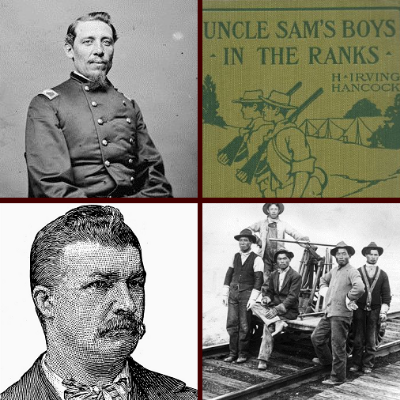
Clockwise from Top Left:
Captain Gilman, Uncle Sam's Boys, Chinese Railroad Workers in Utah 1876, Denis Kearney
The committee quickly ballooned into a total deconstruction of the nation’s military organisation. Captain Howard Gilman, a U.S Army observer during the Franco-Prussian War testified that American troops “would be, no matter their heart or drive, swept aside” if they faced a European foe. The statement outraged many and though Gilman referred to the German Army to which he had been attached it was taken broadly by the Gaston Committee and the press to include more likely foes like Spain and the British Empire. General Sheridan, the highest ranking soldier in the country, also appeared before the group. Sheridan echoed Gilman’s concerns. He noted that the Union had won the Civil War primarily through advantages in numbers and industry, advantages France had also held in 1873. Yet, he continued, strategic superiority and a well-educated officer corps had seen Berlin victorious before attrition could become a factor. Following a scare over possible Spanish intervention in Cuba in January 1878 the committee had also begun to discuss the state of the U.S Navy. Where the Army had been deemed inefficient the Navy was deemed incapable. After 1863 all warship construction had effectively stopped and in the economic hardships following the Panama scandal budgets had been cut to the bone.
Despite an on-paper fleet of 33 capital ships almost half were effectively unmanned, rotting away in port. America completely lacked in ironclads save coastal monitors, leaving oceanic duties to wooden ships of the line [4]. The committee’s final report called for radical measures to reform the United States military with the establishment of a permanent General Staff, ‘prussification’ of the officer corps and a major ship-building campaign. The findings triggered a national panic over the perceived defencelessness of the United States. Local militias swelled with volunteers. Pennsylvania Governor Henry Hoyt, perhaps taking Captain Gilman’s testimony at little too literally, called on German immigrants to provide Teutonic discipline to the State Guard. Previously a European peculiarity, the Gaston Committee also helped bring the invasion novel to American public awareness. Uncle Sam’s Boys, written by Irving Hancock, depicted a British invasion of New England in which iron warships and hoards of Indian soldiers ravaged the region before being defeated by bands of young partisans, the eponymous heroes [5]. The book sold fifty thousand copies in 1880 alone. Hancock quickly followed up the success with numerous sequels while imitators provided tales of incursion by everyone from Prussians to Mole Men to the Chinese. The latter are particularly noteworthy for this period.
A weak economy, insecurities over defence and a growing popular disdain towards land grabs by railroad companies had coalesced into a nativist backlash against Asian immigration. One of the last actions of the Lincoln Administration had been the signing of the 1868 Burlingame Treaty with the Qing Empire, which guaranteed reciprocal fair treatment of citizens in the other’s lands, freedom of religion and most favoured nation status in areas of commerce [6]. As the great railroad boom had gotten underway in the 1860s, a labour shortage had arisen throughout the sparsely populated Western territories of America, driving up the wages of workers both white and black. Companies quickly took advantage of the Burlingame statutes to bring in thousands of Chinese labourers who would work for substantially lower pay. Though state laws, particularly in California, were brought in to limit immigration it continued through the 1870s with many, now joined by their families, settling along the West Coast. San Francisco, the centre of the Chinese-American community, saw the rise of the Workingmen’s Party led by Denis Kearney. Blaming the Chinese for low wages and commercial competition for white shopkeepers, the party encouraged nativist protests and even violence. Such actions were not universally welcome however, with Kearney being derided in the Eastern press and even being offered a duel by civil rights activist Wong Chin Foo [7].
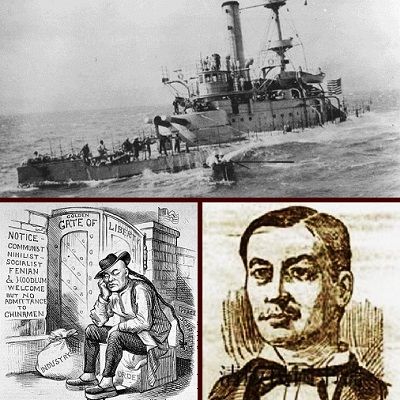
Clockwise from Top:
USS Salacia in choppy waters off Gulf of Mexico 1883, Wong Chin Foo, Anti-Exclusion Cartoon
The Workingmen’s Party were nonetheless popular within San Francisco, severely increasing racial tensions. In the summer of 1879 disputes over businesses operating outside of Chinatown saw violence and finally a full-blown riot in June, leading to dozens of dead and injured. The incident sparked Congressional interest with California Senator Newton Booth leading the call for the total barring of Chinese immigration. The issue went beyond party line with the Republican Booth allying with a Democrat, Theodore Randolph, to influence both sides of the chamber. In the House Representative Henry W. Blair led the charge, using apocalyptic language to warn of the “oriental threat” [8]. The measure soon gained momentum and by late July the Chinese Exclusion Bill was before Congress. President Tilden had little interest in the panic and was certainly no fan of Kearney during his New York speaking tours. Nonetheless he knew a bandwagon when he saw one. Attempting to build bridges with the Southern Democrats he helped alter the bill to ensure current residents would not be repatriated. This was a particular concern for Texas and Louisiana as Chinese labour was still being used to construct the Southern Pacific Railroad, connecting New Orleans to Los Angeles.
The bill passed in August, closing the door to Chinese immigration. Ironically after the troubles of the past two years Chinese Exclusion proved the first popular measure directly associated with the President [9]. Tilden continued to rebuild his reputation by ordering a major recruitment campaign for the Navy and the building of five new ironclad warships that autumn. The ships, dubbed the Salacia-class [10], proved an odd combination of old and new, primarily for budgetary reasons. Several were built on top of keels abandoned in the 1860s, leading the class to retain the low monitor-like hull of its coastal predecessors. Though clearly unsuitable for oceanic travel, the cash-strapped Naval Department insisted they would operate fine in the Caribbean, their intended theatre of operations. This structure necessitated the use of two fully-rotating turrets for armament, at that time a cutting edge design for capital ships. Combined with the four 12-inch guns housed within them, the Salacia-class on launch were the most heavily armed-ironclads in the Americas. However with their outdated hulls, cramped interiors and slow speeds they were quickly christened the ‘ugly ducklings’ by the press. It was perhaps a suitable name as their construction, spread out amongst the East Coast shipyards, was effectively a learning exercise that would pave the way for the modern American navy.
“Mr. Tilden is an ill-starred man” wrote the New York Post in September 1879 and so it was that the President would once again do battle with Congress before the year was out. The Silverites, both in the Democratic and Republican caucuses, had begun to coalesce around Speaker Blackburn following his appointment. The Greenbacks too had become emboldened and Farnsworth put forward a motion calling for full fiat currency. Unsurprisingly, aside from his eleven party colleagues, the House shouted it down. Ever a canny parliamentarian Farnsworth intended it as mere bait, and as the Representatives were heatedly discussing general currency reform the debate moved quickly towards silver. Due to the still languishing economy sympathy for inflationary measures had been quietly growing in Congress. Richard Bland, a Missouri Democrat, put forward a bill calling for the Government to purchase several million dollars’ worth of silver from Western mines every month to inflate the money supply. There was uproar from Bourbon Democrats and Minority Leader Garfield was shocked to find many Republicans supporting the measure. Senator William Allison of Iowa led these primarily Western rebels in backing the measure and by December the now Bland-Allison Bill had been pushed through Congress.
The speed of events caught Tilden completely off-guard. Vice-President Hendricks had assured him he would influence the Senate to reject the radical proposal from the House. As such the President had spent most of the winter focused on foreign affairs with his Secretary of State John Appleton. Tilden was hosting King Kalakaua of Hawaii at the White House when word came of the Act’s passing. Amazingly at the time political news had been dominated by Appleton’s negotiations with Canada over Newfoundland fishing rights and journalists jumped at word of the surprise Silver Purchase Act. Tilden was mortified, as was much of his Cabinet. Treasury Secretary Bayard scolded Hendricks as “an incompetent oaf”. The President, having worked amiably with the House since the appointment debacle, felt betrayed by Blackburn who had used all of his influence to ram the legislation through Congress. In response Tilden immediately vetoed the Act. A tense meeting followed with the Speaker in which he made clear he would “veto this bill a thousand times” if it was necessary. As Washington demobbed for Christmas perhaps the President expected the issue to cool. In this as with many things Tilden would be disappointed.
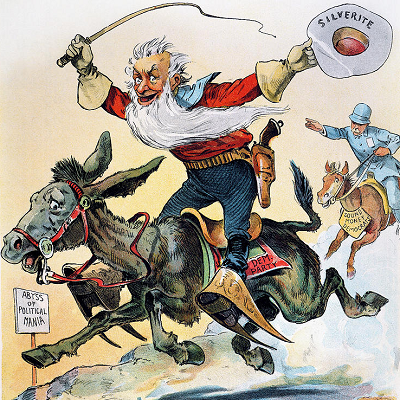
A none too subtle anti-Silverite cartoon
[1] At this point Senators were not elected but appointed by state legislatures.
[2] Bimetallism: The policy of devaluing the dollar by bringing silver into the money supply; great for debtors but not so good for bankers, a key constituency of the Bourbon Democrats.
[3] Lincoln stayed well clear of politics after 1868. He achieved his life-long goal of visiting the Holy Lands in 1869 and died peacefully in his sleep shortly after his seventieth birthday.
[4] This is the in-game state of my fleet in the late 1870s. Numerically I was 11th, on par with Sweden.
[5] Cut out the happy ending and that’s basically all of my British games in Vicky II.
[6] Most favoured nation status has fallen out of use these days due to international free trade. The status basically guarantees you will never subject the other party to greater trade restrictions than any other party.
[7] Wong offered him his choice of weapons, “Chinese chopsticks or Irish potatoes” in reference to Kearney himself being an immigrant, hailing from County Cork. Wong seems to have been a pretty funny guy, writing plenty of satirical articles including one about God ratifying the Exclusion Act in heaven.
[8] IOTL Blair did such a good job that Beijing rejected him as an ambassador in the 1890s and barred him from entering the Empire on pain of death.
[9] But not universally popular. There is a vocal minority of liberals and businessmen annoyed not to mention the Chinese government as the law is a unilateral altering of the Burlingame Treaty. As the China in my game does not end up being the isolationist backwater of OTL this will have some interesting consequences.
[10] Roman goddess of saltwater. For some reason the U.S Navy used a lot of obscure Classical deities when naming their ships in this period.
Last edited:


